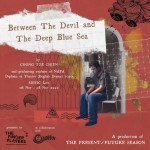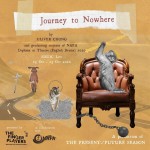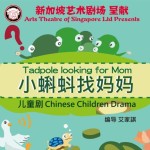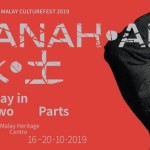“Peepbird: Decay and transformation”
Writer: Teo Xiao Ting
Performance: 8 October 2020
Peepbird opens with Al-Matin Yatim and Vanessa Toh emerging with slick black feathers extending from their shoulders, arms dangling and legs twisting as though they are hatchlings learning how to walk for the first time. The strangeness of being in this new world bleeds through their bodies as they stutter across the stage with feathered limbs, and they preen each other as though trying to comfort one another. Jo Kwek enters soon after, a woman transfixed by these feathered beings. Her gaze follows Toh and Yatim relentlessly as she hovers. She lifts her limbs in an attempt to mimic their movements. Although I cannot see her face covered by a huge black hat, her desire to become these winged beings is palpable. The trio’s tentative movements resonate with how we have all regressed to newborns, trying to relearn how to be again.
Stepping into the Esplanade Recital Studio for the first time since COVID-19 on 7 Oct 2020 felt like an initiation into a whole new world. The effusive warmth I thought I would feel from the return of live performance gave way to apprehension, emerging from the same unease I’ve felt for months now since the theatres closed and talks of a “new normal” proliferated my social media feed. This sentiment is not unique – there are others who wrote of this loss and sadness, such as Jocelyn Chng for ArtsEquator, who described her own return to theatre. This world feels to be in the midst of transformation, with everything shifting in unnervingly tectonic ways.
For the next 60 minutes, I watch on as Kwek weaves through larger-than-life crow puppets, animated by Yatim and Toh. She desires to become a puppet herself, as her limbs, unadorned by feathers, twitch to mirror the feathered movements of the puppets. But her first attempt at transformation is futile – she remains as she is, a flightless human. My heart sinks as she slides onto the bench, seemingly fusing with the cool grey concrete. Was she giving up? I recall giving up, at some point during this long-drawn pandemic, sinking into myself, unwilling to emerge. At this very moment, the rhythm of the soundscape built by Darren Ng picks up speed and shakes me out of my reverie. The increasingly urgent cacophony of strings seems to declare, “No, it’s not time to give up.” The transformation is still ongoing, and Kwek’s journey to become a crow herself is not yet done. We are not yet done.
Then comes the first transformation, the most intense sequence in the hour I share with Peepbird. The stage floods with a dim red light, and a flurry of black feathers circle Kwek as she wrestles with Toh and Yatim, who are trying to envelope her in a dark fabric larger than herself. Draped entirely in black, it is almost impossible to tell where the puppets end and puppeteers begin. There are no attempts to hide the puppets’ moving mechanisms, and I can clearly see the puppeteers’ bodies moving behind each twitch of a wing, each sharp turn of the head. The visibility of their bodies makes me think of the crow-puppets as characters, as conduits for mimicry. This makes Kwek’s desire all the more poignant, as the crows she wants to become can never achieve true flight; they can only rely on their puppeteers to mimic wing movements.
As the tussle between the puppets, Kwek, Toh and Yatim stretches on, I almost concede that Kwek will never emerge. Just as I start to feel the cold dread of despair, her head peeks out, revealing her new self, now donned with the same black feathers as those that had previously engulfed her. Her human identity discarded, she cocks her head as though she is unsure of how to be now that she has arrived at her destination, as a crow. What now? As if to cast doubt on the desirability of being a crow-puppet, the same crow-puppet that was the subject of Kwek’s obsession is torn apart by the very same pair of hands that had enlivened it. As Toh yanks the puppet apart and its innards splay across gunny sacks spread out on the floor, Yatim perches close by, simply observing, unmoved by the carnage. This act of violence seems wholly natural, in order to make room for other puppets, other crows, other beings.
In the midst of dissonant rumbling strings and the engulfing shadowy costumes – designed by MAX.TAN – the darkness of Peepbird is inescapable. In another review of Peepbird written by Nabilah Said for ArtsEquator, she confesses a desire for celebration and colour, something effervescent to mark the (tentative) return of live performance. A part of me shares her desire, but another part of me is grateful for Peepbird’s honest reflection of this murky period, how it materialises the tangle of thoughts and emotions we have collectively felt for months as livelihoods and plans decay right in front of our eyes, as we are helpless to do anything to stop it. The image of decay is deeply embedded in Peepbird, though it is not as simple as dust to dust — it is inextricable from metamorphosis. Kwek’s own metamorphosis mirrors how my body reactivates and reorients itself as I come to be in the presence of live performance again. I find myself craning closer to the stage to be nearer to the electric energy of living bodies moving other bodies.
At the end of the play, Toh emerges from the backstage now draped in white feathers. It is a stark contrast to her previous self, which was covered entirely in black. Unlike Kwek’s transformation, I am not privy to Toh’s process; it seems almost like magic the way she disappears only to reappear completely changed. The only constant throughout the second half of the play is the crow-puppet, previously eviscerated by Toh, swept under the gunny sacks.
There is something both hopeful and devastating in what I witnessed. In Peepbird, the process of transformation is necessarily violent. A previous reality has to be ruptured in order to make room for a new one. I think of words conjured by Rebecca Solnit in A Field Guide to Getting Lost: “The early stages of change or cure may mimic deterioration. Cut a chrysalis open, and you will find a rotting caterpillar…the process of transformation consists almost entirely of decay”. Peepbird cuts right into the chrysalis of whatever this current time is, and made a space for me to confront this strange new world as it swivels, in all its decays and joys.
Do you have an opinion or comment about this post? Email us at info@centre42.sg.
ABOUT THE PRODUCTION
PEEPBIRD by The Finger Players
7 – 8 October 2020
Part of The Present/Future Season 2020
Esplanade Recital Studio
ABOUT THE WRITER
Xiao Ting recently graduated from Yale-NUS College with a major in Arts & Humanities and a minor in Psychology. Her writing practice started with poetry, and has since moved towards a sort of explicit response. She’s still feeling out the contours of a “reviewer”, and thinks that each review is actually an act of love that documents and critically engages with performance.
This article is part of the C42 Documents: The Present/Future Season series.
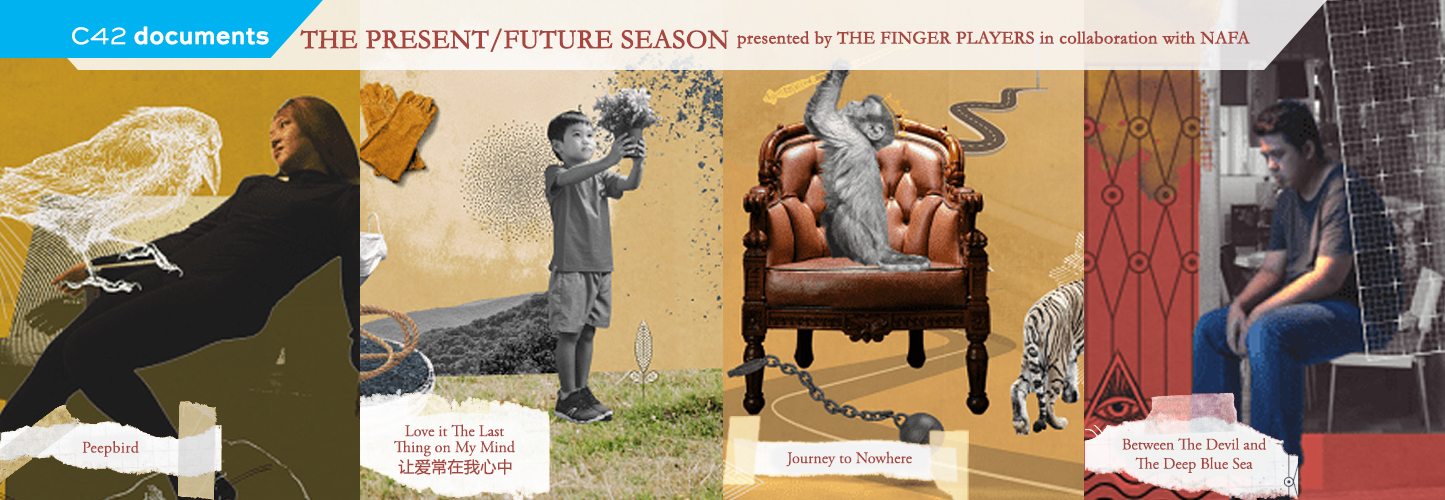
Centre 42 documents the creation process performances of the four productions in The Finger Player’s (TFP) The Present/Future Season. This documentation partnership with TFP aims to capture the inner workings of staging a production, illuminate the working relationships between practitioners and students, and create a textual record of the performance. Each production is documented by two writers, one focused on the performance-making process, and the other on the performance itself. The Present/Future Season was presented by TFP in collaboration with Nanyang Academy of Fine Arts (NAFA), and ran from 7 Oct to 8 Nov 2020.
C42 Documents: The Present/Future Season
[Process] Of First Flights and Transformations: Documenting “Peepbird”
[Process] What is Love?: Documenting “Love is the Last Thing On My Mind”
[Process] The Art of the Seamless Transition: Documenting “Between the Devil and the Deep Blue Sea”
[Performance] “Peepbird”: Decay and transformation
[Performance] “Journey to Nowhere”: Subversive, political take on a renowned classic tale
[Performance] “Love Is the Last Thing on my Mind”: Simple, poignant reminder to love”
[Performance] “Between Devil and the Deep Blue Sea”: From stage to screen

